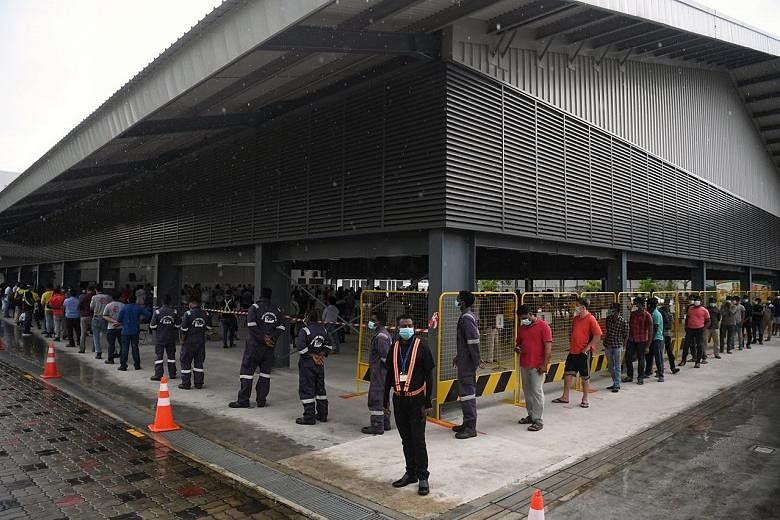SINGAPORE - To scale up routine Covid-19 swab testing for migrant workers, more in-dormitory testing facilities and Regional Screening Centres will be set up by the end of the year.
There are currently 24 rostered routine testing (RRT) facilities in dormitories, with nine more to be set up by the end of this month, said the Ministry of Manpower and the Health Promotion Board (HPB) in a joint statement on Thursday (Oct 8).
The increase in rostered routine testing facilities will benefit over 35,000 migrant workers.
Speaking at the Regional Screening Centre located at the Cochrane Recreation Centre on Thursday, director (medical) of MOM's Assurance, Care, Engagement Group Lam Meng Chon said the 33 dormitories were picked based on the large number of workers living there.
"These are places that have a critical mass of migrant workers. Stationing in-dorm RRT stations within (these) dorms encourages convenience and economics of scale," he said.
Dr Lam noted that as of yesterday, about 2,400 workers have still not been cleared to resume work as they had not completed their rostered routine testing. This is down from 5,700 such workers on Sept 18.
"We will continue to work with employers to explore ways to help them register their employees for RRT," he said.
Those working on shifts currently have access to swab testing at night at facilities in Acacia Lodge in Bukit Batok, Cassia @ Penjuru, Central Staff Apartments in Boundary Close, and Westlite Mandai in Mandai Estate.
Employers can schedule their workers' routine testing appointments at their dormitories, or at 14 of the 20 Regional Screening Centres islandwide.
The HPB is planning to have 25 to 30 screening centres by the end of the year. Two-thirds of these sites will be conducting rostered routine testing.
Currently, all migrant workers staying in dormitories, except Toh Guan Dormitory, need to undergo such testing every two weeks, as part of a multi-layered strategy to prevent and detect new infections earlier.
Those in Toh Guan Dormitory are presently being tested every week as part of a trial to enhance testing efforts.
In the screening centres and in-dorm facilities, over 2,600 swab testing staff are on the ground every day, to conduct swabbing and ensure safety measures are followed.
Currently, the 14 screening centres are conducting rostered routine testing for migrant workers living in dorms, and workers from the construction, marine and process sectors.
These centres are in places such as The Float @ Marina Bay, the Old Police Academy and Singapore Turf Club.
Through the online Swab Registration System, employers can select their preferred swab locations and testing dates to schedule their workers for testing at either the in-dorm facilities or the screening centres.
Once workers attend their first routine testing appointment, the system will automatically schedule them for the next appointments.
Since its roll out in August, the Swab Registration System has seen continuous enhancements to ease navigation and provide helplines for employers.
Ms Lucy Tan, chief human resource officer of NatSteel, which has about 440 workers that need to undergo rostered routine testing, said employers would previously have to rush to book slots for their workers.
However, the new automatic scheduling system removes the need for this and has made the process more convenient.
Ms Tan added that having in-dorm swab centres helps reduce disruptions to operations.
"When (the workers) are at various test centres, we don't know what time they'll complete (testing), and production has to stop because we have workers all over. So we can't even function," she explained.
But having rostered routine testing facilities within the dorms allows her company to organise the worker's schedules in a systematic manner.
MOM and HPB reiterated that rostered routine testing is a critical part of early detection of Covid-19, and to contain its spread.
"Workers and employers are reminded to ensure that those who are required to undergo RRT continue to do so, in order to safeguard their health and that of the wider community," they added.
"It is only through our collective effort that we can prevent, arrest and contain the risk of Covid-19 transmissions and infections."













